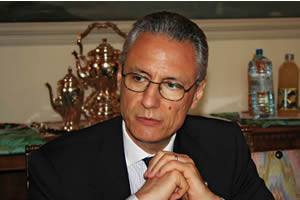Italian public scare prompts migration controls
Under fire from the European Commission, Italy is introducing tough new immigration measures to quieten public fears of an immigrant crime wave
 |
|
|||||||||||||
At the end of May, the new Italian Government adopted a package of laws against ‘illegal’ immigrants in a move criticised by Brussels and other EU member states such as Romania, which has 100,000s of citizens living and working in the peninsula.
Regardless of whether they are EU citizens, some unauthorised immigrants will risk a penalty of up to four years in prison.
Critics say this threatens to destabilise one of the pillars of the European Union, the free movement of people.
The Silvio Berlusconi-led Government believes this will help his country fulfill its election pledge to tackle rising crime, which many Italians blame on illegal immigrants, especially the Roma from countries such as Romania and Bosnia and Herzegovina.
Romanian Prime Minister Calin Popescu Tariceanu last month blamed Italian authorities’ failure to stop the establishment of illegal settlements by, in particular, the Roma minority, on the edges of cities such as Rome. “In other European countries where there are Romanian citizens, there is not such a problem,” added the PM.
But Italian Ambassador to Bucharest Daniele Mancini tells The Diplomat that his Government had to respond with firm solutions to “the overwhelming need for security felt by Italian public opinion”.
According to the new Italian laws, all foreigners condemned to more than two years in prison in Italy will be expelled from the country. “We are not considering limiting the liberty on free movement, but we have to have a better control over foreigners living and working in Italy,” the Ambassador says. “The Romanian Government needs to also assume responsibility towards its citizens in Italy.”
The Ambassador adds that the majority of Romanians living legally in Italy are honest workers. There also remains a business case for immigration, because entire sectors of the Italian economy depend on foreign labour.
The Romanians of Roma ethnicity have been moving to Italy in massive numbers in the last ten years. Meanwhile Italian statistics show 150,000 Roma ethnics living in Italy, half of whom are Italian citizens. But Mancini says the Italian Roma have learned to respect the law, while fresh immigrants are in the process of doing the same.
But there are no clear statistics on crimes rates committed in Italy by Roma, because the authorities only need to register citizenship at the time of arrest. In addition, the majority of Romanians who break the law, even if they are Roma, do not speak of their ethnicity.
Last October, 24 year-old Romanian Roma Nicolae Mailat killed, robbed and possibly raped Giovanna Reggiani, an Italian women living in Rome. Another Romanian, a cousin of Mailat, gave up his relative to the police.
“In general, the Roma minority who commit crimes are caught for petty crimes, such as thieving, pick-pocketing and not sexual aggression or physical assault, which is why the Mailat case was out of the ordinary,” says Mancini.
The European Commission will make a report on the issue of outlaw Roma groups in the EU member states by December 2008, drafting the most relevant actions that EU Governments should take.
The presence of Romanians in Italy has tripled in the last four years, reaching almost 500,000 people working legally in the peninsula and the number of crimes has increased in direct proportion. Unofficial statistics state that almost 1.5 million Romanians live in Italy.
“It remains to be seen if we are witnessing an end of the Romanian immigration to Italy or if the Romanians working in Italy are starting to return to their home-country,” Mancini says.
Around 15 per cent of the Romanian workforce is living outside its own country, which could undermine the foundations of its manufacturing economy.
“I do not see how a country which wants to become more developed, such as Romania, will be able to face the situation when an entrepreneur cannotfind manpower,” he adds. “This is why Italian companies may decide to move back to Italy, relocate to another region of Romania or to another country.”
Many Italian companies have set up in west Romania, especially around Timisoara. Some have already moved their production facilities to Moldavia, especially in clothing and shoe-making, because the workforce is cheaper and more plentiful.
Interview by Ana Maria Nitoi
Enel: power generation targeted for southeast
With two major coal-fired power projects under discussion for Braila and Galati, its ongoing discussions for a stake in nuclear power station Cernavoda, Constanta county and its purchase of wind energy projects in Dobrogea, Enel is looking to develop a mixed portfolio of power generation projects in the southeast of Romania.
The company has already bought two power distribution companies Enel Distributie Banat and Enel Distributie Dobrogea and, since winning the auction for the privatisation of Bucharest-inclusive distributor Electrica Muntenia Sud, hopes this 820 million Euro takeover will be completed this month.
Enel is not showing interest in acquiring any of the three remaining distribution companies, Electrica Muntenia Nord, Electrica Transilvania Nord and Electrica Transilvania Sud.
“We are constantly scouting for projects in the generation sector, while consolidating and finalising the integration process of our existing operations,” says CEO of Enel Romania Matteo Codazzi.
Enel wants to reach a balanced fuel mix of nuclear, coal and renewables to provide electricity on the long term.
The energy group has been selected among six foreign and domestic investors to build two other reactors of the nuclear power plant in Cernavoda along with CEZ, RWE, Iberdrola, ArcelorMittal Romania and Electrabel. But Romanian state company Nuclearelectrica, the seventh future investor in units 3 and 4 in Cernavoda, has boosted its desired share in the project by more than 20 per cent. Since then CEZ stopped negotiations. The construction of the two nuclear reactors, planned to have an installed power of 750 MW each, is supposed to start in 2009 and be completed by 2015, with a total investment of 2.2 billion Euro.
“We are still waiting for the official position of the Romanian Government regarding the way in which the authorities intend to implement the initiative,” says Codazzi. “Only at that point we will be able to evaluate our position towards the Government’s intention to increase its participation.”
Enel is also evaluating the development of a greenfield investment in a one billion Euro coal-fired power plant with at least 800 MW in the Free Zone of Galati, eastern Romania. The project is viewed by the local authorities with some scepticism due to environmental risks. But the Italian company says it intends to use a high-level technology to satisfy EU environment rules.
Galati is in a good position due to water transportation on the Danube River and railway connections to the ex-Soviet space where raw material can be accessed. But the project needs to receive environment approvals from the Romanian, Moldovan and Ukrainian authorities, considering its proximity to two borders.
Enel, in a consortium with E.On, is also negotiating with state-owned Termoelectrica for a participation in another 800 MW coal-fired power plant project in Braila, 50 km from Galati. “There are still ongoing negotiations between the consortium and Termoelectrica,” says Codazzi.
Globally, Enel is a leader in renewables, with approximately 30,000 MW in plants in hydro, geothermal, wind, solar, biomass and co-generation.
In wind energy the company earlier this year bought up some projects in Dobrogea, east Romania, which are still yet to be developed. “In the generation portfolio that we envisage for Romania, renewable energy will have an important role and, with the acquisition of Dobrogea wind projects, we have already taken an important step,” says Codazzi.
But to streamline the development of wind projects, which requires many permits from different ministries and agencies, Codazzi believes the Government needs to centralise the authorisation procedure.
Enel Romania
Power distributor and future energy producer
Enel Distributie Banat, Enel Distributie Dobrogea and Electrica Muntenia Sud
■ Employees: 3,360
■ Employees for three distribution companies: 5,700 people
■ Investments 2007: 108 million Euro
■ Planned investments: two billion Euro for its three distribution companies over 15 years
Pirelli: producing filters in Gorj county by year-end
Pirelli Tyres Romania operates two production facilities in Slatina, Olt county where it produces tyres and metallic cables for cars and this year plans to open a 25 million Euro anti-pollution filter factory in Gorj county, close to the Romania-Serbia border.
Around 1,400 people were employed at the end of last year by the Italian investor in Slatina and a further 400 are due to be hired for the ten-hectare plot in the Gorj county industrial park, where the company will produce 500,000 filters for diesel engines annually.
The tyre factory in Slatina produced in 2007, the first year of operation, two million units, but the annual production capacity will be doubled by the end of 2008.
More than 90 per cent of Pirelli’s production in Romania is exported to the group’s companies everywhere, except for the Far East.
“Pirelli’s presence in Romania has international relevance because it helps accomplish the company’s objective to conquer the tyre markets in central and eastern Europe,” says Enrico Malerba, CEO of Pirelli Tyres Romania
Ferrari, Porsche, Lamborghini, Audi, Mercedes, BMW, Aston Martin and Jaguar are among the luxury car brands for which Pirelli is manufacturing the tyres. “In the near future we will also focus on co-operating with Ford, Fiat and Volvo,” Malerba says.
Like many large manufacturers, Pirelli is concerned over the lack of workforce in Romania. Due to social disadvantages in Olt county, the younger generation are prompted to move to Bucharest or leave the country. “It is even more difficult to find skilled workers in a town as socially unattractive as Slatina, but in these conditions the challenge is even greater,” Malerba says. “This year we are focusing on finding experienced engineers and other technicians.”
Cefin Group:
predicting a doubling
of turnover in 2008
The transport and logistics market will see intensive growth this year with an increase rate of 15 to 20 per cent in 2008 and a forecast of 10 to 15 per cent for the next years, according to Stefano Albarosa, CEO of Cefin Group.
“While in other European countries the rate growth stands at five to six per cent, the Romanian transport market is growing three times faster,” he adds.
However the poor state of the roads means companies need to invest in fuel and vehicle maintenance. The 20 billion Euro available through the EU funds between 2007 and 2013 for infrastructure should help support the Government budget to further develop the market, if this is absorbed successfully.
This year Italian mixed interest group Cefin is targeting a 400 million Euro turnover, an increase of 48 per cent on 2007. “We will invest large amounts in the expansion of logistic spaces countrywide,” says Albarosa. “We want to be present in all the important cities of Romania.”
Cefin Automotive Comerciale, the dealer of Iveco trucks, plans to increase its market share from 9.5 per cent in 2008 to 11 per cent in 2010, through the delivery of 4,000 new trucks and 2,000 second hand trucks.
Cefin Automotive, a provider of spare parts, service equipment and logistics and distributor of tyres, also plans to increase its market share to 22 per cent, estimated at 200 million Euro, and to open 18 new work points in 2008.
Cefin real estate:
entering luxury market
This year the real estate division of the company will deliver its first residential project, six luxury apartments with four or five rooms over 220 to 230 sqm each, built in Bucharest’s diplomatic residential street of Aleea Alexandru.
“We wanted to add a luxury project to our portfolio and we decided to develop our first residential project in a refurbished old building,” says George Margescu, managing director of Cefin Real Estate Romania.
Cefin will also deliver 50,000 sqm of logistics space in Cefin Logistic Park Bucharest, under development on the Bucharest-Pitesti Motorway. “Many of our customers decided to expand in the same park and we will keep building up to 330,000 sqm,” Margescu adds.
Cefin’s A1 Business Park on Bucharest-Pitesti motorway with a total built area of 150,000 sqm, will see another 60,000 built sqm this year.
This August the company will start to develop a residential and mixed project on Blvd Barbu Vacarescu to be delivered by 2011. The project will include 50,000 sqm of offices, a five star hotel comprising 300 rooms and a conference centre for 2,000 people, as well as 10,000 sqm of commercial spaces.
In Timisoara, on Strada Balea, the company will build 300 apartments in partnership with Heitman Investment Fund.
‘Cortina Residence’, located in Pipera-Tunari, covering 7,500 sqm and including 280 apartments is another project which will be delivered in 2009. The company owns land plots in Bucharest, Arad, Sibiu, Suceava, Targu Mures and Iasi, where it plans to develop residential and retail projects.
“The total value of our portfolio including land plots and ongoing projects, stands at 900 billion Euro,” Margescu says.
Unicredit: planning to open consumer finance division
Unicredit Tiriac Bank will this year focus on organic growth by opening 70 more branches and hiring 1,000 more people by mid 2008.
“The high volume growth planned for 2008 will be achieved only by adoption of a prudent risk management policy,” says Rasvan Radu, CEO UniCredit Tiriac Bank.
A merger between the German HVB Bank, Romania’s Banca Tiriac and Italy’s UniCredit, UniCredit Tiriac Bank focused its attention in 2007 on the retail banking sector, a trend that continues this year as the company plans to open a Consumer Finance division.
This October UniCredit will also be the first local bank to open a ‘contemporary art space’ in one of its bank locations on Blvd Titulescu, close to Piata Victoriei.
Unicredit Tiriac Bank
■ Net profit in 2007: about 72 million Euro
■ Employees: 2,750
■ Branches: 164
■ Branches to open in 2008: more than 70
Intesa Sanpaolo:
aiming to double network
in 18 months
Part of the Italian market leader, Intesa Sanpaolo Bank Romania is planning to open a universal bank network and double its number of branches to 120 by 2009.
To support this accelerated growth the bank has increased its share capital by 100 million Euro.
For now Intesa Sanpaolo Bank is a niche bank focused on small and medium enterprises with a market share of one per cent. The bank will also focus on building up its retail option and will launch a leasing division.
“Our objective is to reach a market share or three to four per cent,” says Nicola Calabro, CEO of Intesa Sanpaolo Bank. “From then on we will be an important challenger to the top ten players on the Romanian market.”
In the last two years Intesa Sanpaolo Bank almost doubled its assets and its network. “We want to grow but with a prudent risk policy,” adds Calabro.
Banca Intesa Sanpaolo
■ Assets 2007: about 500 million Euro
■ Gross Profit 2007: 5.5 million Euro
■ Employees: 620
■ Branches: 60
UniCredit Leasing:
focusing on fleet management hire
Leading the Romanian leasing market with a market share of ten per cent and a turnover of 0.5 billion Euro, UniCredit Leasing is playing it safe this year.
“We will invest only if we think that it’s really worth it,” says Septimiu Postelnicu, CEO of UniCredit Leasing. “We prefer to invest in good funds with a good price than to sell in large quantities at a cheap rate.”
Leasing for equipments and commercial vehicles was a major segment for UniCredit Leasing’s business last year, especially because of the boom in construction. For this year the company is focusing on expanding operational leasing sector, where customers do not make a final purchase of the product. This includes the hiring out of fleets of vehicles.
“Operational leasing is still a niche product,” says Postelnicu. “The trend on the EU market is the other way around and the operational leasing has the the lion’s share of the market.”
The CEO also believes that leasing for the medical equipment and green energy sector will also flourish in the near future.
Unicredit Leasing
■ Turnover 2007: over 500 million Euro
■ Forecast turnover 2008: around 600 million Euro
■ Branches: 16
■ Employees: 196
■ Ranking in the sector: Leader
■ Market share: 10.25 per cent
Generali Asigurari: cleaning out car portfolio
to raise profits
After 15 years on the Romanian market, Generali Asigurari has as a main objective for 2008 to grow its profits after last year only registering a profit of about one million Euro.
The first step in this direction was cleaning out their car insurance portfolio, by excluding clients who have been involved in too many accidents.
But this isn’t easy.
“Year after year the insurance premiums are diminishing,” says Tudor Moldovan, general director for Generali Asigurari. “This is very strange because looking to our most important engine of growth, car insurance, it is obvious that the risks are higher because of the bad traffic conditions, the excessive number of vehicles and aggressive drivers.”
Moldovan thinks that there is great potential for the Romanian insurance market to grow considering that the total value of the life insurance market is only 400 million Euro for a population of 22 million
“It is too bad that the Romanian Government does not want to give any kind of tax exemptions for life insurances, even in very developed economies like Germany or France, this was the first step made in order to encourage people to save,” says Moldovan “Now the Romanian insurance market is going through a phase of consolidation because all the major Romanian insurance companies have been sold and the top ten players have foreign capital.”
In 2008 Generali Asigurari hopes to see an increase of 50 per cent in their life portfolio. To achieve this, they plan to open about 30 more agencies, in a 1.5 million Euro investment.
Still under debate is the Government’s proposal to make house insurance compulsory to protect homeowners against natural disasters such as floods. But insurance companies are protesting because they are businesses that exists to make money, not offer social protection. “If the government wants a social protection system why do they not set up a small tax which should be paid by everybody and create a special fund for disasters and calamities,” says Moldovan.
Generali Asigurari
Insurance firm
■ Market share: five per cent
■ Ranking in the market: eigth
■ Profit 2007: about one million Euro
■ Gross written premiums: about 111 million Euro
■ Agencies: 71
■ Employees: 352
Stefanel: luxury brands forced to open in
malls due to lack of
high street options
Luxury clothes brands should stay away from shopping centres and try to open high street stores to attract customers with deeper pockets, who usually avoid the malls, argues Lucio Manfreda, managing director of Stefanel for Romania, Hungary, Poland, Czech Republic and Slovakia.
“A luxury brand should not be present in a shopping centre,” he says. “In Romania many brands opened in malls because there was no other choice.”
The exception in Bucharest is Calea Victoriei. “Retailers can rent a space in old buildings on Calea Victoriei, but they have an unclear legal status and there is risk of eviction for brands after having invested a lot of money in opening a store,” he adds. “There are also not enough parking spaces in the area.”
A small shopping ‘gallery’ clustering luxury brands, like Mario Plaza on Calea Dorobanti, where Stefanel is present, is another option. Stefanel opened two stores last year - one in Cluj-Napoca’s Iulius Mall and another in Bucuresti Mall. This year the company will open a new store inside Fashion House Outlet Center, part of the West Park real estate project on the Bucharest-Pitesti Motorway.
Store developers find it difficult to draw up an expansion strategy because many of the shopping centres announced on the market or under development are not delivered on time or at all.
“We do not target all the shopping centres in Romania because we cannot count on the delivery time of the mall,” he says, “and, secondly, it is sometimes difficult to choose between three or four shopping centres in a city with the same catchment area.”
Stefanel
Clothes producer and designer
■ Year established in Romania: 1991
■ Turnover 2007: 5.7 million Euro
■ Forecast growth for 2008: 14 per cent
■ Employees: 110
■ New store due to open in Fashion House Outlet Center, West Park, Bucharest
■ Stores: 11
Cellini: jewel consumers opting for elegance
Romanian jewel customers have been mostly interested in the size, weight or colour of a potential purchase, but Sodo Migliori, which has brought the Cellini retail brand to Romania, is seeing its customers begin to recognise sophistication in the luxury accessories market.
“We try to bring the focus onto what we like and to educate the public to prefer elegance,” says Alessandro Amato, general manager of Sodo Migliori.
The majority of Cellini’s clients are women and the most desired object is the ring, followed by ear-rings, pendants and bracelets. When it comes to watches, men bring most of the revenues for Cellini.
Now there are 14 Cellini stores and four Swarovski boutiques. The next target for Amato is Constanta, where the company will open two more Cellini stores and a Swarovski boutique in an investment that could reach up to 700,000 Euro. “The Romanian market has a great potential to grow and Romanians have developed a taste for luxury, especially for watches,” says Amato. “They know what they want and are asking for more.”
For the jewellery market, Romania has very high excise taxes. This year it is 15 per cent and in the next year it will fall to ten per cent. Only in 2010 will this be eliminated. “This is a great problem for the internal market,” says Amato. “Every other country which joined the EU eliminated this excise tax long ago.”
For the Swarovski crystals, this excise tax is even higher. This year it is 35 per cent and only in 2010 will the tax be eliminated.
Sodo Migliori
Retailer of jewels and luxury accessories
■ Turnover 2007: over ten million Euro
■ Employees: 150
■ Stores: 14 Cellini and four Swarovski boutiques
By Corina Ilie, Alexandra Pehlivan and Ana Maria Nitoi

















